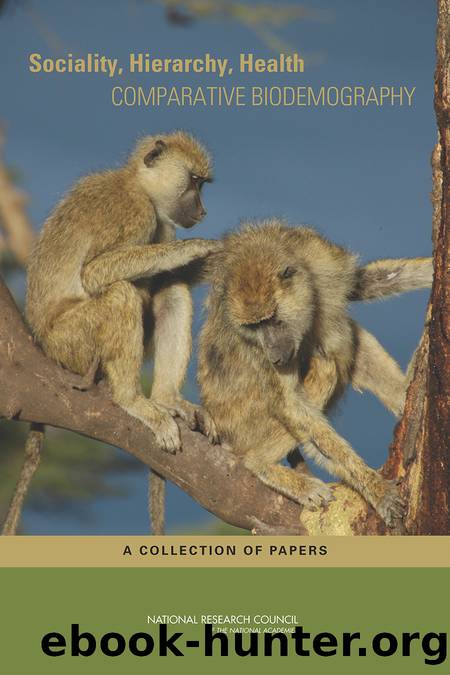Sociality, Hierarchy, Health: Comparative Biodemography by Maxine Weinstein

Author:Maxine Weinstein
Language: eng
Format: epub
Tags: ebook, book
Publisher: The National Academies Press
Published: 2014-09-15T00:00:00+00:00
9
Work to Live and Live to Work: Productivity, Transfers, and Psychological Well-Being in Adulthood and Old Age
Jonathan Stieglitz, Adrian V. Jaeggi, Aaron D. Blackwell, Benjamin C. Trumble, Michael Gurven, and Hillard Kaplan
INTRODUCTION
This paper considers psychological well-being in adulthood and old age, in light of the economic and social structure of the evolved human life history. Psychological well-being is the subject of significant scientific inquiry in large-scale modern societies (e.g., Easterlin, 2003; Blanchflower and Oswald, 2008; Diener and Chan, 2011), and it is often associated with economic productivity, social status, and network strength. However, very little is known about the evolutionary origins of mood variation or about mood variation during the course of human evolution. In fact, it has been suggested that depression is a maladaptive by-product of modern lifestyles due to inadequate pathogenic exposure in development, low physical activity level, high prevalence of metabolic disorder, or high levels of psychosocial stress from economic inequality, intense social competition, and residential isolation from kin (Raison et al., 2010; Rook et al., 2013).
One way to assess evolutionary implications of mood variation is to focus on small-scale societies. Small-scale societies possess similar socioecological features typical of the vast majority of human evolutionary history, including food insecurity, limited material wealth, and high pathogen burden coupled with little access to health care, but also frequent resource pooling, relative egalitarianism, and minimal social isolation. Research into psychological well-being in small-scale societies can (a) determine whether mood disorders exist, and if so, examine whether risk factors and buffers are similar to those in modern societies, and (b) provide insight into the role of mood variation during human evolutionary history.
This paper has two goals. The first is to present an evolutionary framework for investigating the role of social relationships in affecting psychological well-being, and how it varies over the lifecourse and in different socioecological contexts. The second is to provide data on the prevalence and correlates of reduced psychological well-being and interpersonal conflict in a small-scale society, the Tsimane of Bolivia, to illustrate an empirical application of the framework. We hope to stimulate further research across populations and social contexts rather than offer a systematic review of the literature on psychological well-being.
Our central thesis is that flows of resources and assistance are critical in every phase of the human lifecourse and that psychological well-being responds to the nature and quantity of those flows. One universal feature of human life histories in small-scale societies is downward intergenerational resource flows (discussed in this volume by Lee, Hooper et al., and by Ellison and Ottinger; for original data, see Kaplan, 1994, and Kaplan et al., 2000, 2010; also see Lee, 2000, for data on the cross-cultural universality of downward flows within families). Children are net receivers of resources and assistance, whereas parents and grandparents are net givers during both reproductive and post-reproductive years. A second universal feature is the formation of marital bonds in which there is a flow of resources and assistance between spouses (see Hooper et al., this volume, and references cited therein).
Download
This site does not store any files on its server. We only index and link to content provided by other sites. Please contact the content providers to delete copyright contents if any and email us, we'll remove relevant links or contents immediately.
Cecilia; Or, Memoirs of an Heiress — Volume 1 by Fanny Burney(31352)
Cecilia; Or, Memoirs of an Heiress — Volume 3 by Fanny Burney(30950)
Cecilia; Or, Memoirs of an Heiress — Volume 2 by Fanny Burney(30907)
The Great Music City by Andrea Baker(21621)
We're Going to Need More Wine by Gabrielle Union(18087)
Bombshells: Glamour Girls of a Lifetime by Sullivan Steve(13120)
Pimp by Iceberg Slim(12947)
All the Missing Girls by Megan Miranda(12776)
Fifty Shades Freed by E L James(12464)
Talking to Strangers by Malcolm Gladwell(11909)
Norse Mythology by Gaiman Neil(11902)
Crazy Rich Asians by Kevin Kwan(8373)
Mindhunter: Inside the FBI's Elite Serial Crime Unit by John E. Douglas & Mark Olshaker(7850)
The Lost Art of Listening by Michael P. Nichols(6485)
Enlightenment Now: The Case for Reason, Science, Humanism, and Progress by Steven Pinker(6414)
Bad Blood by John Carreyrou(5782)
The Four Agreements by Don Miguel Ruiz(5533)
Weapons of Math Destruction by Cathy O'Neil(5049)
We Need to Talk by Celeste Headlee(4881)
